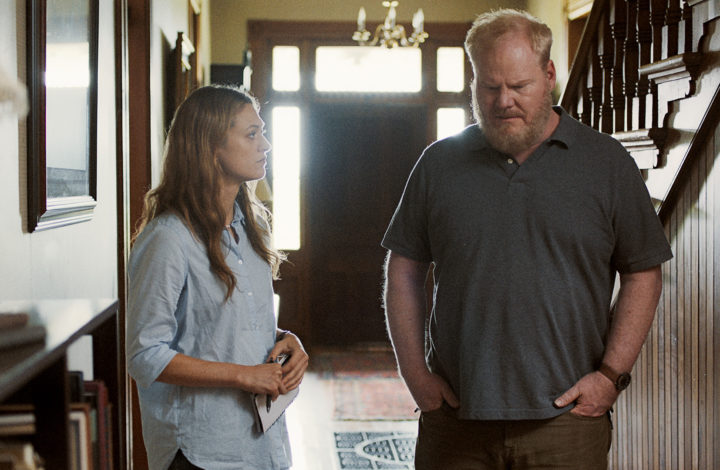
MPAA Rating: NR | Rating: ★★★★½
Release year: 2019
Genre: Drama, Spiritual Director: Paul Harrill
Paul Harrill’s radiant Light from Light dazzles gradually, illuminating our minds and hearts through its quietly affecting aesthetic. In the same vein as 2014’s Something, Anything, Harrill’s beautifully haunting ghost story is interested in exploring the big ideas of metaphysics and human existence within the context of intimate, unassuming character studies. Its ethos is more spiritual than religious, more about wondering about the possibility of the impossible than offering any firm propositional truths. Any revelation is only partial, but even a partial disclosure of transcendence is enough to elicit a frisson of awe.
Harrill is interested in places and the people who populate them. Filming primarily throughout east Tennessee, the green-and-gray landscape of trees and fog serve as the natural backdrop to this humble mystery. Light from Light centers on Sheila (Marin Ireland), a single mother working at a car rental company while doing paranormal investigations on the side. In the film’s opening scenes, Sheila shares a bit of her background on a local radio program—she’s had what can only be described as prophetic dreams, which prompted her towards a vocation of exploring spiritual phenomena: she’s a ghost hunter. When a priest hears the radio interview, he contacts Sheila about Richard (Jim Gaffigan), a grieving widower who believes his deceased wife may be present in their expansive farmhouse. Through her investigation, Sheila learns more of Richard’s story and perspective, and must confront issues in her own life of the nature of time, loss, and love.
In an important secondary plot, Sheila’s teenage son Owen (Josh Wiggins) and his friend/crush Lucy (Atheena Frizzell) explore the possibilities of young romance. When Lucy suggests they go to homecoming together, it prompts a conversation about the inherent temporariness of adolescent affection. If Lucy is going off to college and Owen is going to stay home, why bother? They’ll probably just break up anyway. “What’s the point of getting together if you already know it’s going to end?” Owen asks. And Sheila initially agrees; she thinks Owen is making a wise decision. After all, she’s had her share of broken or temporary relationships—she’s currently solo, without romantic partner or paranormal team. “Don’t fall in love with someone just because they treat you nice,” she tells Owen and Lucy in a car ride to Richard’s house for an investigation. “But isn’t that what you’re supposed to want?” Lucy replies, confused. “Everybody treats you nice at first,” Sheila says. “Things only matter if they last.”
Things only matter if they last. That is, if it’s temporary, it’s essentially not worthwhile. But is this the case? Is it even possible to for anything to truly last, to actually stay the same? And if so, would we really want it that way—a static reality, with no surprises, twists, or revelations? What would Richard say? His wife is gone, taken from him suddenly in an accident; his marriage ended up being more temporary than he ever imagined. So, was it worth it? In this, Light from Light raises difficult yet worthwhile questions about the nature of time, mortality, and love, for with the death comes temporariness—all relationships will come to end when our lives come to an end. Are they worth living for?
But what if there was life beyond life? How would the reality of an afterlife affect our sense of time and relationships in the present? In this, Light from Light explores the possibility of eternity through its ghost story, albeit without a religious agenda. Of course, Light from Light contains overt references to religion—the priest plays an important supporting role in introducing Sheila to Richard, and both Sheila and Richard admit to having backgrounds in the Christian tradition while presently not attending church. Yet these moments don’t feel gratuitous, nor are they preachy; this is certainly not a “faith-based” film. No, this is the contemporary ghost story I was hoping for with David Lowery’s A Ghost Story (Lowery has a producer credit on Light from Light). Where Lowery’s film felt pretentious and vapid in its consideration of grief, Harrill accomplishes what Lowery was aiming for through his modest, humanistic approach. The subdued musical score—mostly quiet electric guitar strumming or the hum of synth—perfectly complements the images, which are purposefully framed without ever trying to draw attention to itself. Gaffigan is perfectly cast as a big teddy bear of a man with a sensitive spirit. Yet Ireland truly stands out as exemplary here, communicating a great deal of emotion and interiority through her posture and bright, distinct eyes.
Where A Ghost Story was agnostic, Light from Light is anatheistic—the term from philosopher Richard Kearney refers to a belief in God after God, a sort of faith beyond faith, where the metaphysical God of religion and philosophy has died and a new openness to the possibility of God, what Kearney calls “the God who may be.” And so when the miraculous occurs in Light from Light, it’s not through big grandiose voices from heaven or spectacular special effects, but in the modest and mundane and gentle. Yet I felt goosebumps, then tears—I was profoundly moved by the coda of this film in ways I’m still not sure I know how to explain. How do these moving images, these fictional worlds, travel through time and space via a screen and enter into our own imaginations, affecting and even transforming our way of being in the world, all under 90 minutes? Indeed, the experience of a film is inherently temporary—there is a beginning and a conclusion, a fixed ending to the relationship between the film and the viewer. Yet with beautiful, transcendent works of art like Light from Light, this provisional encounter doesn’t mean the relationship is closed or dead. For great works of art have the power to stay with us—to haunt our worlds—and thus to heal us.
IMDB Listing: https://www.imdb.com/title/tt9358160/
Leave a Reply